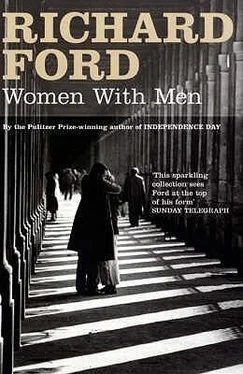Richard Ford - Women with Men
Здесь есть возможность читать онлайн «Richard Ford - Women with Men» весь текст электронной книги совершенно бесплатно (целиком полную версию без сокращений). В некоторых случаях можно слушать аудио, скачать через торрент в формате fb2 и присутствует краткое содержание. Год выпуска: 2006, Издательство: Bloomsbury Publishing PLC, Жанр: Современная проза, на английском языке. Описание произведения, (предисловие) а так же отзывы посетителей доступны на портале библиотеки ЛибКат.
- Название:Women with Men
- Автор:
- Издательство:Bloomsbury Publishing PLC
- Жанр:
- Год:2006
- ISBN:нет данных
- Рейтинг книги:3 / 5. Голосов: 1
-
Избранное:Добавить в избранное
- Отзывы:
-
Ваша оценка:
- 60
- 1
- 2
- 3
- 4
- 5
Women with Men: краткое содержание, описание и аннотация
Предлагаем к чтению аннотацию, описание, краткое содержание или предисловие (зависит от того, что написал сам автор книги «Women with Men»). Если вы не нашли необходимую информацию о книге — напишите в комментариях, мы постараемся отыскать её.
Women with Men — читать онлайн бесплатно полную книгу (весь текст) целиком
Ниже представлен текст книги, разбитый по страницам. Система сохранения места последней прочитанной страницы, позволяет с удобством читать онлайн бесплатно книгу «Women with Men», без необходимости каждый раз заново искать на чём Вы остановились. Поставьте закладку, и сможете в любой момент перейти на страницу, на которой закончили чтение.
Интервал:
Закладка:
“I guess not. She isn't in on the big changes,” Helen said.
“She lives in California. With Penny,” he said. “She's fine. She's a normal six-year-old, if you can be normal in California. She has parents who love her.”
“Would that include you?” Helen wrinkled her mouth as if she was disgusted by him.
“It would. It really would,” Matthews said. Finally spotting the waiter where he lurked in the shadows near the kitchen, he flagged a hand in the air.
“Just checking.” Helen wiped her mouth with her napkin and began looking all around herself. The restaurant contained only two more diners, seated by the dark other wall. Outside the front window, narrow rue Boulard was empty except for parked cars. It was still raining, and streetlights shone on the dappled pavement.
“I'm just feeling jet-lagged tonight,” Helen said. “I'm sorry, baby doll.” She smiled across the plates and small soiled dishes, then sniffed once, as though she might be crying. “You've brought me to Paris. I don't want to pick on you.”
“Then don't, ” Matthews said. “I'm doing the best I know how.” He felt that was exactly what he was doing, but was getting precious little credit for it. Lelia was his daughter and his problem, and he was taking care of it.
“I know you are, sweetheart,” Helen said. “A lot goes on in that head of yours.”
“I wouldn't say that,” Matthews said. He wished they'd left town ten minutes after Blumberg called. They could be happier someplace else.
“I'm guilty of that too,” Helen said to no one in particular. He didn't know what she was talking about. Possibly she hadn't heard him correctly. She was looking out the window, staring wistfully at the Parisian rainfall. “I am,” she said. “We're all guilty of that sin.”
BACK IN THE cold room, Helen quickly undressed in the dark, which was not usual. She had always been proud of her taut chorus-girl figure and preferred the light. But when she got under the covers in the small, chilly bed, she demanded that Matthews get in bed immediately and fuck the very breath out of her, which he did to the best of his abilities, two hands buckled onto the flimsy headboard, one bare foot wedged into a nubbly corner of the wall, the other actually on the tile floor and getting fouled up with his shoes and socks as he whaled away in the still, heatless air, and Helen grew strangely delirious and almost seemed to chant, “Patiently, patiently, patiently,” until they were both complete and lay huddled for warmth, as the rain swept against the windows and the wind hissed through the streets and out through the cemetery's bare treetops.
Sometime later — he'd thought he heard a clock chime somewhere close by, four bells — Matthews awoke and went to the window, the bedspread wrapped around him, his wool socks on. To his surprise, the wind and rain had stopped, and much of the afternoon mist had been sucked away, leaving the cemetery sharply illuminated by moonlight, the ranks of six-story apartment buildings beyond it vivid under the unexpected stars. Though even more surprisingly, the specter of the great Montparnasse Tower blocked the sky in what Matthews now felt must be the west. Farther on, if the night were clearer, he would see the Eiffel Tower itself (this he knew from maps he'd studied when writing his novel).
In the first moments when he'd lain awake beside Helen in the warm bed, listening for the wind, he knew unquestionably that he should never have come here, or should've left after Blumberg's call, and that the whole event was already somehow spoiled, splattered onto everything. The feeling that he “would've” loved Paris overcame him, “would've” but for something he'd already done wrong — some novice's error — but didn't know about. Not that you ever knew about most of the mistakes you were making, or ever much caught yourself. Events, reliances, just began not to work out right for seemingly no reason, then life began to descend into disastrous straits. Helen seemed that way, seemed to be diminishing in a way he couldn't describe but only feel. He liked Helen. He admired her. But he shouldn't have come to Paris with her. That was his mistake. Bringing her was his hopeless attempt to take an experience with him, and afterwards bring it home again, converted to something better. Only if he'd brought Penny with him could that have worked — worked in the sense that the two of them had once been so close as to be two parts of one person. That was years ago. Whatever he'd liked then, she'd liked. Though that was over now.
But at the cold window, with Helen snoring in bed and the thin pink counterpane around his shoulders, Matthews began to feel different, as if the new moonlight and crinkled stars had configured the world newly, and Paris, even in the frosted glowing night, seemed to lie forth more the way he would've wanted had he ever let himself want it. A metropolis of bounteous issue; a surface to penetrate; a depth in which to immerse oneself, even reside in. Coming to Paris now, at his age, with a serious, mature intent, might mean exactly what he'd thought, a wish to stay. Only he wasn't here to convert anything to a commodity he could take back but to suit himself to the unexpected, to what was already here. Helen had been exactly right about that.
Still, he wondered about the translator. Madame de Grenelle. What had “fascinated” her about his not very good book? Some terrible flaw in it? A small, cruel and embarrassing ignorance? Some vast and subtle opportunity missed or misconstrued, which all the French would immediately see but that she meant to correct for him? This, though, was how a novelist thought: things were infinitely mutable and improvable, revisable, renewable — each surface only one side of a great volume to be revealed.
Matthews thought fitfully of Lelia. What time was it in California? He would mount a proper accounting of himself if the moment finally arrived — some California court where he would achieve joint custody. A sensible visiting arrangement. Summers. School vacations. Christmas. Still, he didn't feel like the father of a six-year-old daughter, unseen for nearly two years owing to her mother's intransigence. Occasionally he confused Greta in his book with Penny and imagined Penny dead. He'd made her up and in time would stow her away.
But was it that odd not to see your daughter, given conditions of relative hostility? A settled, more predictable life seemed better, even in California, though Penny seemed increasingly if mysteriously disapproving the longer they were apart. As if he was missing some opportunity he didn't even know about. Eventually it would resolve itself.
Across rue Froidevaux, at the far corner of rue Boulard, in an apartment building that must've been the exact nineteenth-century vintage as the Nouvelle Métropole, only one window was left lighted. But in it was a Christmas tree, its red and green and orange bulbs blinking in the windless night. No person was visible. The tree simply stood alone, high up and unnoticeable from the street: a beacon of a sort for no one. Possibly, Matthews thought, Americans lived there and couldn't do without a tree far from home. The French, of course, would never be bothered. “Joyeux Noël” was enough for them. For a long moment, his feet beginning to ache, the cold slicing in between the folds of his coverlet, he tried to stare across at the tree's shimmery lights and focus on them, to receive the tree's tiny fancy festiveness as his own. Matthews stared and stared, and in a time which wasn't so long he felt he'd succeeded in at least that small wish.
IN THE MORNING they slept late, almost until noon. Though in his sleep bells had been ringing and ringing, and twice he thought he felt Helen get out of bed, heard her throwing up behind the closed bathroom door, followed by her climbing back in bed, cold and apparently dampened. It was colder in the room now. That he was certain of.
Читать дальшеИнтервал:
Закладка:
Похожие книги на «Women with Men»
Представляем Вашему вниманию похожие книги на «Women with Men» списком для выбора. Мы отобрали схожую по названию и смыслу литературу в надежде предоставить читателям больше вариантов отыскать новые, интересные, ещё непрочитанные произведения.
Обсуждение, отзывы о книге «Women with Men» и просто собственные мнения читателей. Оставьте ваши комментарии, напишите, что Вы думаете о произведении, его смысле или главных героях. Укажите что конкретно понравилось, а что нет, и почему Вы так считаете.












